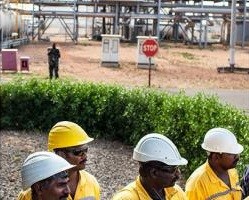 Relative calm had returned to South Sudan's oil-producing Unity state after government forces recaptured the state's capital, Bentiu, in January. The South Sudanese Petroleum Ministry had put forth a July 2014 deadline for resuming oil production, but the ongoing rebel offensive in the state has halted any attempts to meet that deadline. Any damage the oil facilities sustain in a rebel takeover would only prolong the time it would take to bring production back to pre-crisis levels.
Relative calm had returned to South Sudan's oil-producing Unity state after government forces recaptured the state's capital, Bentiu, in January. The South Sudanese Petroleum Ministry had put forth a July 2014 deadline for resuming oil production, but the ongoing rebel offensive in the state has halted any attempts to meet that deadline. Any damage the oil facilities sustain in a rebel takeover would only prolong the time it would take to bring production back to pre-crisis levels.
Oil production in Unity state, which at 50,000 barrels per day makes up about one-fifth of South Sudan's current production capacity, has been completely halted since fighting broke out near the oil facilities in December 2013. Interested outside parties have since weighed in on the matter. China has reiterated its interest in a diplomatic solution to the conflict, which has disrupted Chinese oil investment, and the United States and France have called on the U.N. Security Council to impose sanctions on Juba over the continued fighting.
The violence throughout Unity state, particularly the fighting near Bentiu and other contested population centers, has directly affected security at nearby oil facilities. When the initial fighting over Bentiu broke out in December 2013, foreign oil companies -- mainly Chinese, Indian and Malaysian firms -- withdrew foreign staff from their facilities after performing emergency shutdowns.
The emergency shutdown procedures reportedly damaged some of the oil facilities, and while the local security situation seemed to improve after government forces recaptured Bentiu in January, the repairs and other procedures required to resume oil production were expected to last until July. Further damage the oil facilities sustained during the ongoing fighting will probably push that deadline back by at least several months, as will the state's degraded security situation, which was set back further by the government's inability to reorganize and mount a counterattack.
South Sudan's prospects for resuming oil production depend on whether its military can re-establish security effectively enough to allow foreign personnel to return to oil facilities, a process that requires recapturing a lot of territory in Unity state. The military's ability to do this is dubious. The sudden rebel offensive has demonstrated the rebels' surprising capability to concentrate strength in northern Unity state, possibly indicating that the rebels already in the area have received significant reinforcements. Military commanders in the area as well as the South Sudanese government have claimed that Sudanese fighters, including Janjaweed militiamen and Misseriya tribesmen, have come from the north to support the rebel offensive. If true, this could explain how the rebels were able to make such a strong push in northern Unity while so many of their comrades were in the state's southernmost reaches.
A Show of Strength
It is possible that rebels had reinforcements from neighboring states. A significant mobilization of the "White Army," an ethnic Nuer militia, was reported almost a month ago in Upper Nile state. Rebel leaders claimed the mobilization was aimed at mounting an offensive against oil fields in northern Upper Nile state and against the capital, Malakal. However, the offensive never materialized. Some fighting has continued in the most northern parts of the state, where oil production of about 165,000 barrels per day is continuing, but rebel forces have not been able to expand their territory there, and the government claims to be able to resist them. Since the rebel fighters in Upper Nile state have not demonstrated any increase in combat strength since the "White Army" mobilization, it is possible that these fighters traveled along the Sobat River, where they reportedly embarked on barges, to the White Nile, potentially allowing them to link up with rebels in northern Unity state.
There is no confirmation on the nature or origin of the increased strength displayed by rebel forces in Unity state. But any type of outside reinforcement could seriously complicate the government's attempts to regain control over the area and establish a secure environment that would allow the resumption of work needed to restart oil production.
Meanwhile, Juba may be losing international support in its struggle against the rebels, as evidenced by the calls for sanctions by the United States and France, which are concerned that the government is not cooperating with efforts to find a political resolution. At the same time, the lack of interest from East African countries that had earlier threatened to take military action against the rebels is frustrating South Sudanese President Salva Kiir Mayardit as his military suffers heavier setbacks in Unity state and as the rebels continue to threaten to take over oil fields in Upper Nile state. Losing U.N. support could cause more hesitation and limit the external support Juba could count on amid a deteriorating security situation in its oil-producing regions. Kiir could be forced to accept talks to reach a political settlement in order to safeguard his international support.
Courtesy : Stratfor (www.stratfor.com)